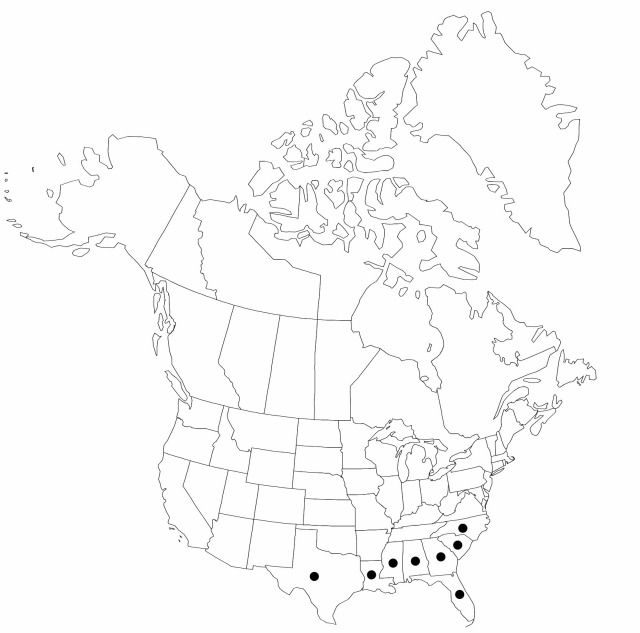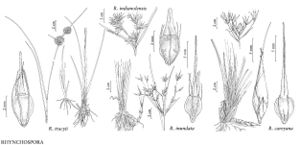Difference between revisions of "Rhynchospora tracyi"
Trans. New York Acad. Sci. 11: 84. 1892.
FNA>Volume Importer |
FNA>Volume Importer |
||
| Line 14: | Line 14: | ||
|name=Phaeocephalum tracyi | |name=Phaeocephalum tracyi | ||
|authority=(Britton) House | |authority=(Britton) House | ||
| − | }}{{Treatment/ID/Synonym | + | }} {{Treatment/ID/Synonym |
|name=Schoenus triceps | |name=Schoenus triceps | ||
|authority=Vahl | |authority=Vahl | ||
| Line 32: | Line 32: | ||
|elevation=0–100 m | |elevation=0–100 m | ||
|distribution=Ala.;Fla.;Ga.;La.;Miss.;N.C.;S.C.;Tex.;West Indies;Central America (Belize). | |distribution=Ala.;Fla.;Ga.;La.;Miss.;N.C.;S.C.;Tex.;West Indies;Central America (Belize). | ||
| − | |discussion=<p>Rhynchospora tracyi frequently forms clones extending for acres by means of its long slender rhizomes. Its wandlike, terete, supple culms, and round-capitate clusters of spikelets suggest a rush more than a sedge.</p> | + | |discussion=<p><i>Rhynchospora tracyi</i> frequently forms clones extending for acres by means of its long slender rhizomes. Its wandlike, terete, supple culms, and round-capitate clusters of spikelets suggest a rush more than a sedge.</p> |
|tables= | |tables= | ||
|references= | |references= | ||
| Line 56: | Line 56: | ||
|publication year=1892 | |publication year=1892 | ||
|special status= | |special status= | ||
| − | |source xml=https://jpend@bitbucket.org/aafc-mbb/fna-data-curation.git/src/ | + | |source xml=https://jpend@bitbucket.org/aafc-mbb/fna-data-curation.git/src/8f726806613d60c220dc4493de13607dd3150896/coarse_grained_fna_xml/V23/V23_355.xml |
|genus=Rhynchospora | |genus=Rhynchospora | ||
|species=Rhynchospora tracyi | |species=Rhynchospora tracyi | ||
Revision as of 17:07, 18 September 2019
Plants perennial, clonal, to 120 cm; rhizomes scaly, slender, less than 2 mm thick. Culms erect, leafybased, wandlike, nearly terete, multiribbed. Leaves ascending or erect, longest nearly equaling culm; principal blades linear, involutecylindric, to 3 mm wide, apex tapering, subulate. Inflorescences terminal, heads 1–4, dense, macelike, 1–1.5 mm thick; involucral bracts leafy, proximalmost overtopping inflorescence. Spikelets greenish, lanceovoid, 5–6 mm, apex acuminate; fertile scales boat-shaped, 5 mm, apex acute to shortacuminate, midrib slightly excurrent or not. Flowers: perianth bristles 6, exceeding fruit body, antrorsely barbellate. Fruits 1 per spikelet, 6–8(–8.7) mm; body pale greenbrown, laterally compressed, obcordiform, 2.5–3(–4) mm, margins thick, rounded, not crimped, apex barely exserted, setulose, surfaces nearly plane, minutely cancellate (latticed); tubercle (style base) linear, angled, 4–6 mm, much narrower than fruit summit, setulose.
Phenology: Fruiting late spring–fall.
Habitat: Emergent in shallows of cypress domes, marshes and swales, ditches and ponds
Elevation: 0–100 m
Distribution

Ala., Fla., Ga., La., Miss., N.C., S.C., Tex., West Indies, Central America (Belize).
Discussion
Rhynchospora tracyi frequently forms clones extending for acres by means of its long slender rhizomes. Its wandlike, terete, supple culms, and round-capitate clusters of spikelets suggest a rush more than a sedge.
Selected References
None.
